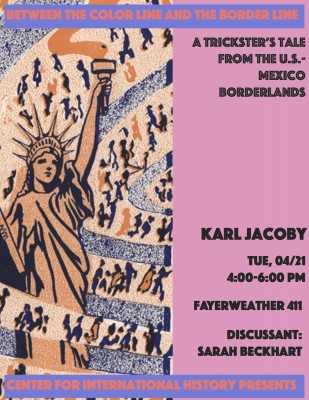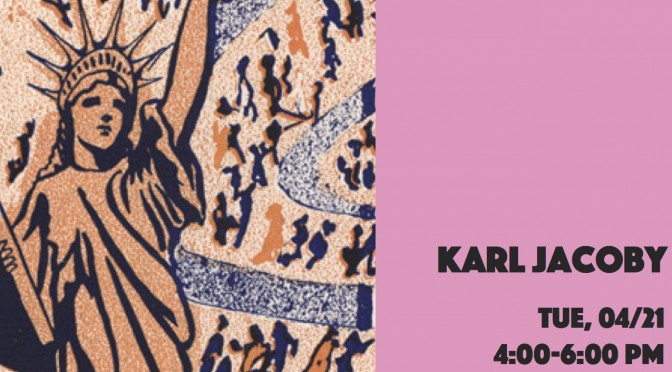

Karl Jacoby: “Between the Color Line and the Border Line: A Trickster’s Tale from the U.S.-Mexico Borderlands”

Department of History, Columbia University, New York


April 8, 2014
REFRAMING ‘INDIA’ IN EXILE: THE EXCENTRICITIES OF PERIPHERAL VISION AND A VIEW FROM THE CENTRE
Location: Fayerweather 411
Time: 5:30-7:00pm
Speakers: Benjamin Zachariah (Karl Jaspers Centre for Advanced Transcultural Studies, Heidelberg University)
Abstract: In the first half of the twentieth century, political emigres and exiles from India found themselves in a position to become the voice of a colonised and oppressed country before an audience comprising often sympathetic, if not always well-informed, citizens of various countries of the world in which they found themselves. The ways in which they found this voice had much to do with their ability to reframe the problem of India in terms intelligible to these audiences. In so doing, they also embarked on a process of self-education and ideational translation that was transformative of the ways of conceptualising India in the world, and the world for India. The various framings of India, sometimes by the same person for different audiences, is revealing of the ways in which existing and emerging languages of legitimation were mobilised, and affected the reframing of ‘India’ both at home and away from India, by those identified with India as a national entity as well as those foreign to it. The ways in which peripheral subjects speaking from and to the centres of world power were crucial elements in conceptualising the periphery for its own subjects at home is an important aspect of the mobilisation and movement of diverse ideas in the first half of the twentieth century. How did the persons move back and forth? How did this movement of ideas work? How were these transmitted? These questions take us past the themes of the limited or constrained agency of the native informant, towards a more dynamic model of moving ideas.
Date: April 11-12, 2014
This Graduate History Student Conference will focus on the spaces where individuals and groups come into contact with the institutions and symbols of the state. We will ask how such spaces of citizenship have been constructed, delimited, and at times rejected, and how the terms of interaction and negotiation in these spaces have been defined and re-defined. In addition, we will look at the moments when individuals or groups have been excluded from citizenship, and when citizens and non-citizens have created alternative venues to mobilize and define their identity beyond the reach of Latin American nation-states.
More information at: http://2014citizenshipconference.com
Contact: [email protected]